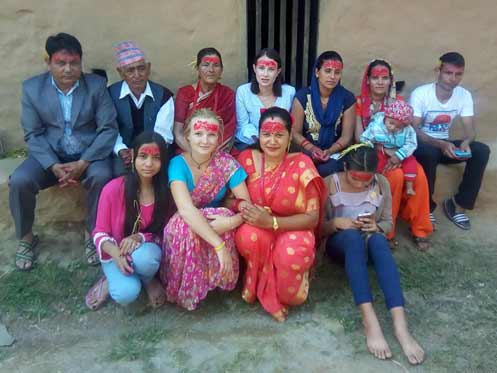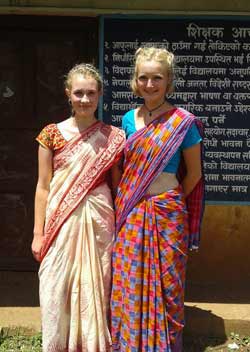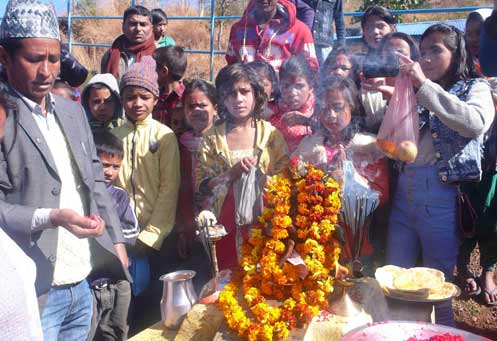|
|
 |
Leonie Jurkschat's Gap Year Grant report 2017
The Trust awarded a Gap Year Grant to Leonie Jurkschat.
Leonie taught English in Nepal with Project Trust. This is
her report on her return.

Report to the Roughley Trust
In August 2016 I stepped onto the plane headed towards the
most interesting, weird and funny year-and-a-bit I've lived.
Plunged into a new world
I came out to Nepal with the help of Project Trust, who
placed me as a volunteer English teacher in Rukumkot, Rukum, a
remote but surprisingly developed village in the Nepali pahad
(hills - mountains to us UK dwellers). Here, together with my
partner Eleanor, I was plunged into a new world: new language,
new family, new food, new habits and customs, new job and new
expectations.
 I
won't lie - at first it was pretty hard, and the idea that we
would enjoy or even love this place was hard to imagine. We
didn't understand all but the simplest of conversations, were
frustrated at our lack of independence, compared to what we
were used to at home, and daunted by the task of teaching huge
classes of lovely but not exactly motivated students. But
slowly, surely, we got taken in and adopted by this beautiful
country and soon realised that far from bringing "much-needed
help" it was us that had so much to learn from these
incredible people. I
won't lie - at first it was pretty hard, and the idea that we
would enjoy or even love this place was hard to imagine. We
didn't understand all but the simplest of conversations, were
frustrated at our lack of independence, compared to what we
were used to at home, and daunted by the task of teaching huge
classes of lovely but not exactly motivated students. But
slowly, surely, we got taken in and adopted by this beautiful
country and soon realised that far from bringing "much-needed
help" it was us that had so much to learn from these
incredible people.
Learning Nepali
The first (and last, and constant) step is language. Having a
bilingual background, I realise that language and culture are
very much intertwined, and learning Nepali shows me a much
bigger difference than between the fairly similar, European,
languages that I know. Obviously the most important reason to
learn is to be able to communicate people on a day to day
basis, but their language also gives you many clues about
their culture's values and attitudes. For example, there is a
much larger vocabulary for relations (like maiju, your
mother's brother's wife) that are evidence of the strong
social structure and four levels of pronouns, from the very
familiar to the very polite, which make the relationships
between people clear.
It is a logical and intuitive language, and with a relatively
small set of rules and words you can express most everyday
interactions. However, it has been hard for us to get beyond
that basic level of "getting by". Sadly, there's still so much
we don't understand, leaving us knowing the rough topic of
conversation without any idea of the actual content or
opinions. It seems that there's a limit to how much you can
pick up by just talking to people and "properly" learning
Nepali so we can feel fluent is one of the biggest motivations
to spend more of our life here!

"Have you eaten rice?"
Food, besides water, shelter and human company, is the most
important thing in life. Nepal taught me to fully realise this
and now the daily question "Have you eaten rice?" (rice, being
the only meal that can be taken seriously, is synonymous with
food in Nepal) no longer seems strange or trivial. It's of
genuine interest - and if you haven't eaten, I'll make you
something. The joy of a fresh vegetable is immense, the
satisfaction of cooking a good meal was often the highlight of
our day, and you know where all the food you are eating has
come from - usually from the garden by the house. And you
always share what you have with everyone.
Family is everyone
We came to love and appreciate the strength of family in
Nepal. You look after your family, and your family looks after
you. This doesn't just include your relatives and neighbours -
everyone is your brother or sister, your mother or your son.
Strangers will always help you and you can completely rely on
the network of people. If something goes wrong on a journey,
or you need some information, someone will call someone who
knows someone who can sort you out. In a country like this it
is the most simple thing for a phone left behind in a hotel to
be delivered to you via bus drivers or acquaintances or
whoever happens to be going in the right direction
I've never not felt safe in Nepal, even in the middle of a
night in an unknown city, because I know I can trust the
people. Also, of course, young children are everyone's
responsibility, and with age comes respect; it feels so
natural yet often is not recognised back home.

Nepal felt like home
So these are the areas in which I feel I've learnt and
developed the most, though there are many other things such as
flexibility with time and plans, not worrying about things
going wrong, keeping myself and my environment clean,
resourcefulness, and of course: dancing! I have seen beautiful
places and faces, been in ridiculous and funny situations,
laid foundations for some lifelong friendships and become part
of a family, both of the village and the whole country.
Nepal has well and truly become home.
Best wishes
Leonie
|
 |
|



